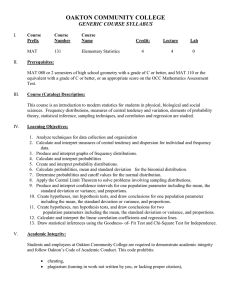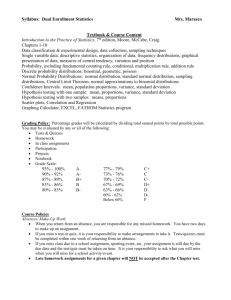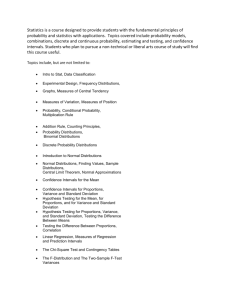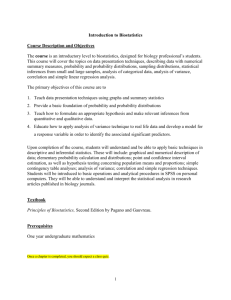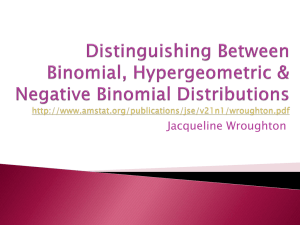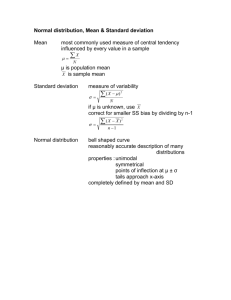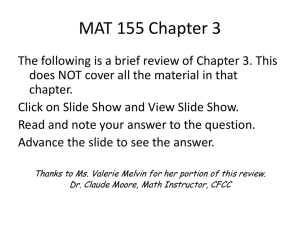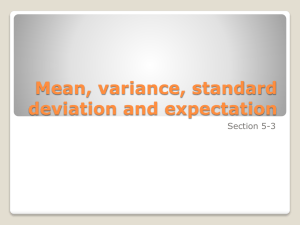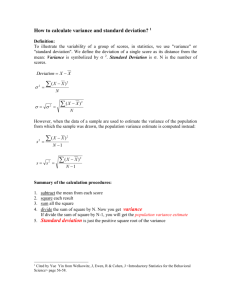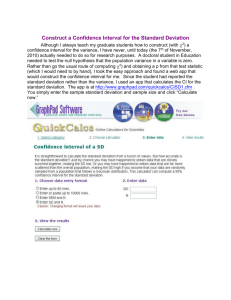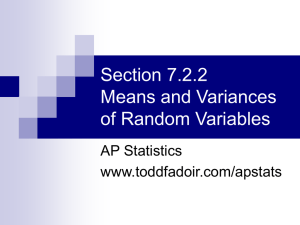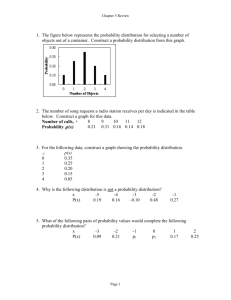OAKTON COMMUNITY COLLEGE
advertisement
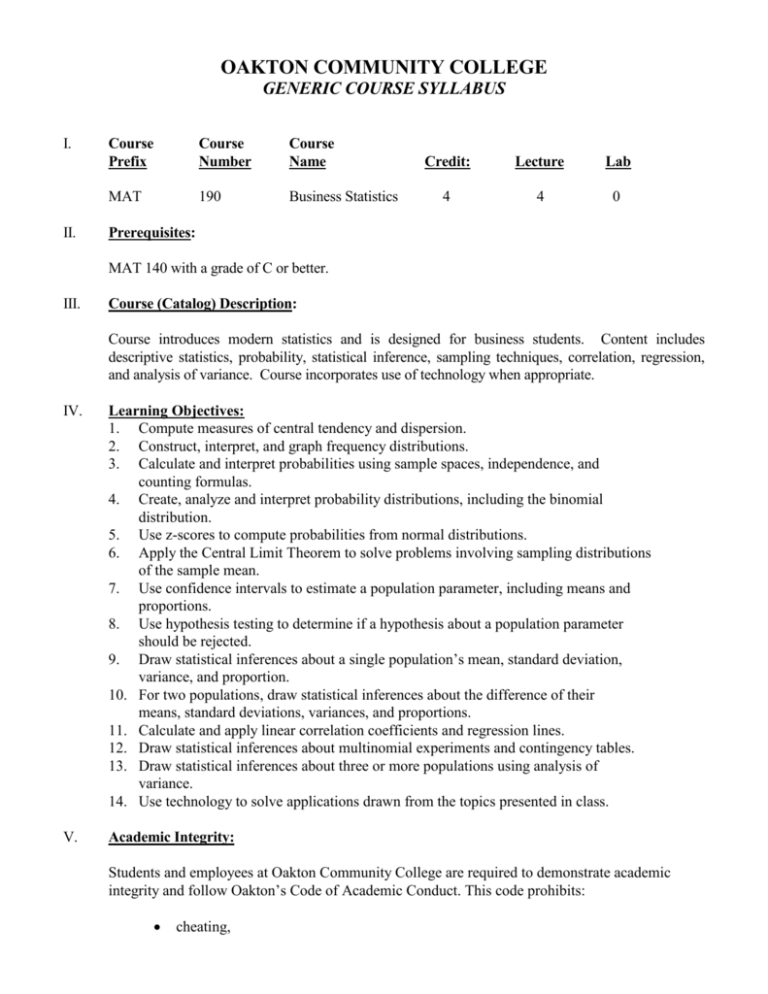
OAKTON COMMUNITY COLLEGE GENERIC COURSE SYLLABUS I. II. Course Prefix Course Number Course Name MAT 190 Business Statistics Credit: Lecture Lab 4 4 0 Prerequisites: MAT 140 with a grade of C or better. III. Course (Catalog) Description: Course introduces modern statistics and is designed for business students. Content includes descriptive statistics, probability, statistical inference, sampling techniques, correlation, regression, and analysis of variance. Course incorporates use of technology when appropriate. IV. Learning Objectives: 1. Compute measures of central tendency and dispersion. 2. Construct, interpret, and graph frequency distributions. 3. Calculate and interpret probabilities using sample spaces, independence, and counting formulas. 4. Create, analyze and interpret probability distributions, including the binomial distribution. 5. Use z-scores to compute probabilities from normal distributions. 6. Apply the Central Limit Theorem to solve problems involving sampling distributions of the sample mean. 7. Use confidence intervals to estimate a population parameter, including means and proportions. 8. Use hypothesis testing to determine if a hypothesis about a population parameter should be rejected. 9. Draw statistical inferences about a single population’s mean, standard deviation, variance, and proportion. 10. For two populations, draw statistical inferences about the difference of their means, standard deviations, variances, and proportions. 11. Calculate and apply linear correlation coefficients and regression lines. 12. Draw statistical inferences about multinomial experiments and contingency tables. 13. Draw statistical inferences about three or more populations using analysis of variance. 14. Use technology to solve applications drawn from the topics presented in class. V. Academic Integrity: Students and employees at Oakton Community College are required to demonstrate academic integrity and follow Oakton’s Code of Academic Conduct. This code prohibits: cheating, plagiarism (turning in work not written by you, or lacking proper citation), falsification and fabrication (lying or distorting the truth), helping others to cheat, unauthorized changes on official documents, pretending to be someone else or having someone else pretend to be you, making or accepting bribes, special favors, or threats, and any other behavior that violates academic integrity. There are serious consequences to violations of the academic integrity policy. Oakton’s policies and procedures provide students a fair hearing if a complaint is made against you. If you are found to have violated the policy, the minimum penalty is failure on the assignment and, a disciplinary record will be established and kept on file in the office of the Vice President for Student Affairs for a period of 3 years. Details of the Code of Academic Conduct can be found in the Student Handbook. VI. Outline of Topics: A. Descriptive Methods 1. 2. 3. B. Basic Probability Theory 1. 2. 3. C. Sample spaces, counting, factorials Combinations, permutations Probability laws Probability Distributions 1. 2. 3. D. Frequency distributions and graphing Measures of location - mean, median, quartiles, percentiles Measures of variation - variance, standard deviation Normal distribution and normal curve Binomial distribution and its relation to the normal distribution Random samples and sampling techniques Statistical Inference 1. 2. 3. 4. 5. 6. 7. Estimation The classical approach to hypothesis testing The probability - value approach to hypothesis testing Inferences involving one population with regard to means, standard deviation or variance, and proportions Inferences involving two populations with regard to means, standard deviation or variance, and proportions Coefficient of correlation and regression lines Multinomial experiments and contingency tables 2 8. VII. Analysis of variance Methods of Instruction: (To be completed by instructor) Methods of presentation can include lectures, discussion, demonstration, experimentation, audiovisual aids, group work, and regularly assigned homework. A TI-83 or 84 graphics calculator will be used for instructional purposes. Other technology will be used when appropriate. VIII. Course Practices Required: (To be completed by instructor) Course practices can include attendance, assignments, special projects, classroom activities and assessments. Course may be taught as face-to-face, media-based, hybrid or online course. IX. Instructional Materials: Note: Current textbook information for each course and section is available on Oakton's Schedule of Classes. Within the Schedule of Classes, textbooks can be found by clicking on an individual course section and looking for the words "View Book Information". Textbooks can also be found at our Mathematics Textbooks page. Other Required Materials: A TI-83 or higher model graphics calculator. X. Methods of Evaluating Student Progress: (To be completed by instructor) Evaluation methods can include graded homework, quizzes, chapter or major tests, individual or small group projects, calculator/computer projects and a final examination. XI. Other Course Information: Individual instructors will establish and announce specific policies regarding attendance, due dates and make-up work, incomplete grades, etc. If you have a documented learning, psychological, or physical disability you may be entitled to reasonable academic accommodations or services. To request accommodations or services, contact the Access and Disability Resource Center at the Des Plaines or Skokie campus. All students are expected to fulfill essential course requirements. The College will not waive any essential skill or requirement of a course or degree program. 3 Effective beginning term: Fall 2014 (term) (year) Ending term ___________ (term) (year) Syllabus prepared by: 2013-14 Math Syllabus Committee (chair: P. Boisvert) Date Mar 2014 Reviewed by Dept/Program Chair: J. Hassett Date Mar 2014 Approved by Dean: R. Sompolski Date Mar 2014 4
